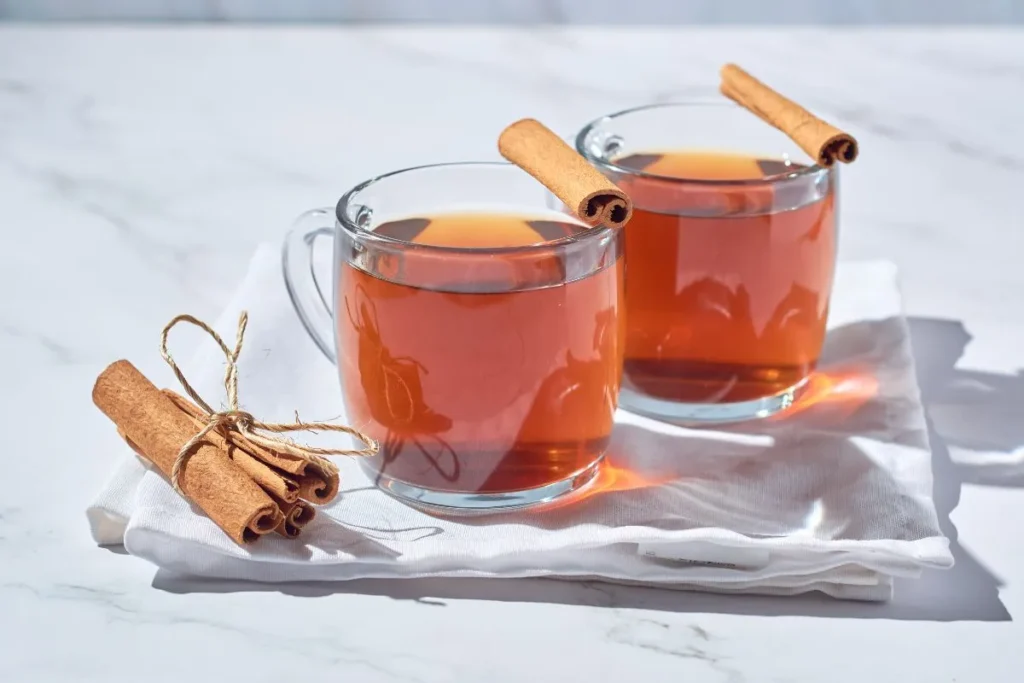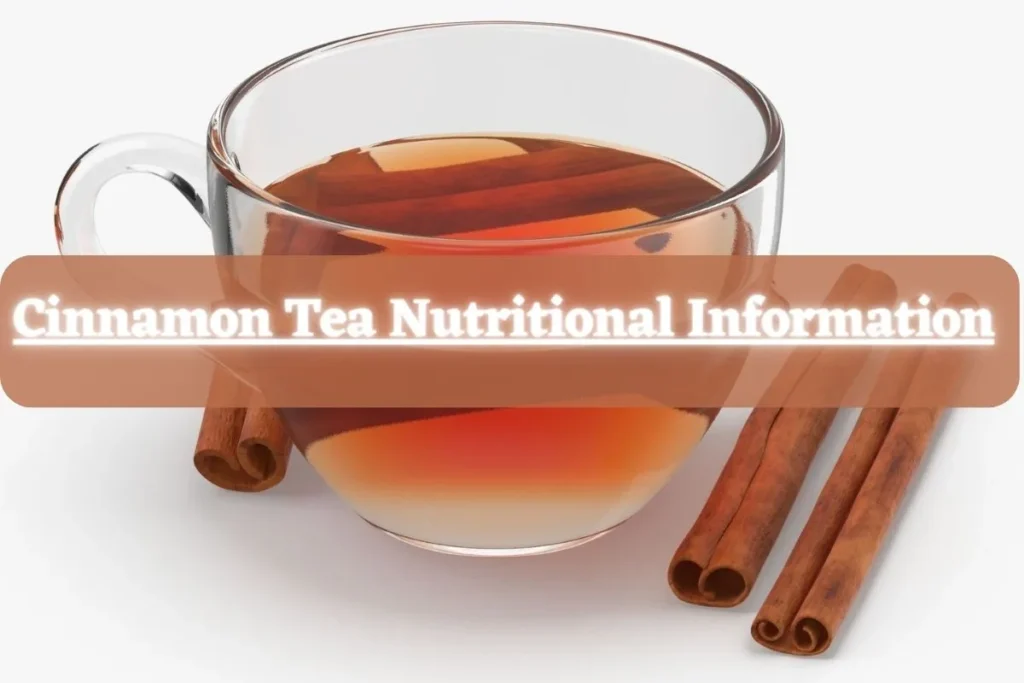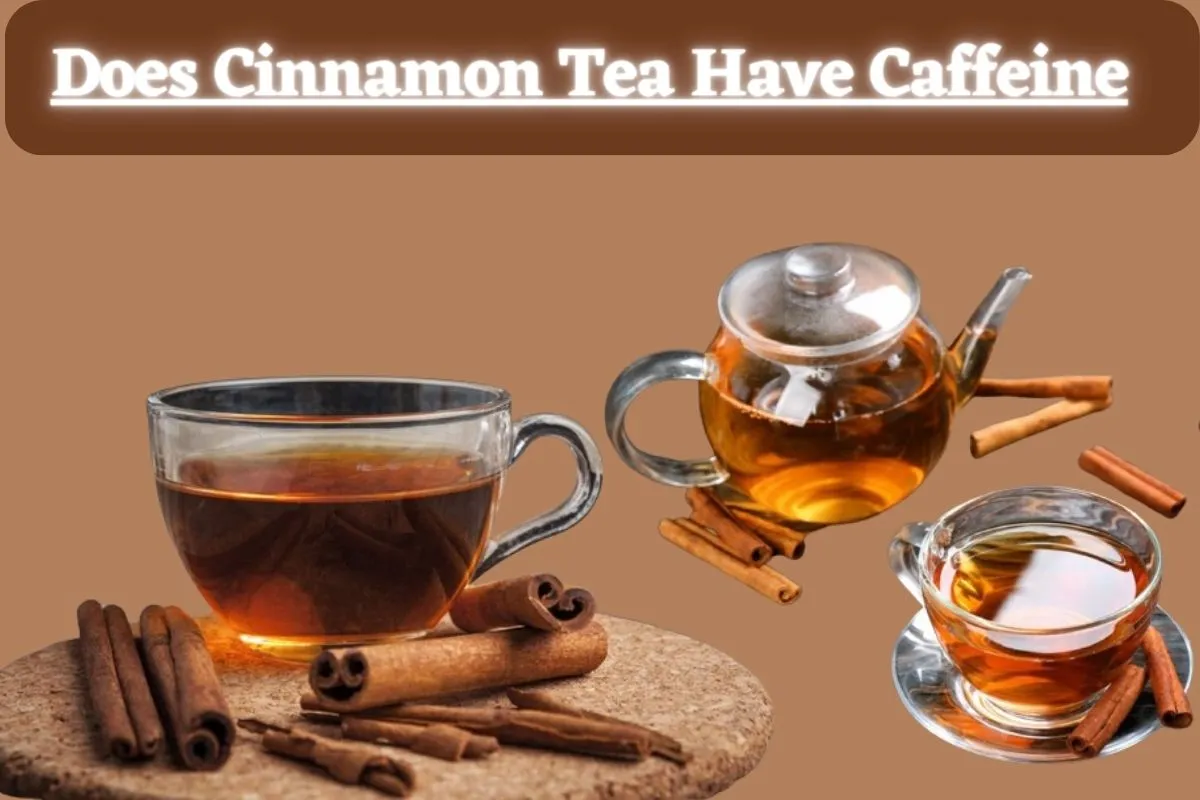Cinnamon, a spice beloved for centuries, graced the rituals of ancient Egypt and fueled the ambitions of European empires. Today, its sweet and spicy warmth fills countless mugs of cinnamon tea.
But as you sip this comforting brew, a question might arise: Does Cinnamon Tea Have Caffeine? Let’s explore whether cinnamon tea offers a jolt or a purely relaxing experience.
Importance of Knowing Caffeine Content in Cinnamon Tea
Cinnamon tea, derived from the fragrant bark of the cinnamon tree, offers a naturally sweet and subtly spiced flavor. This drink has found a place in kitchens and traditional medicine practices for centuries.
Used historically in ancient Egypt and throughout Asian cultures, cinnamon tea has been associated with potential health benefits like aiding digestion, offering antioxidant properties, and potentially supporting blood sugar management.
However, a common misconception exists about caffeine content in cinnamon tea. True cinnamon tea, brewed purely from the cinnamon bark, is naturally caffeine-free. This makes it a suitable option for those who are caffeine sensitive or looking for a relaxing, non-stimulating beverage.
But, it’s important to note that if other caffeinated ingredients like black tea are added to a cinnamon blend, then the drink will no longer be caffeine-free.
Individuals with certain health conditions like pregnancy, breastfeeding, or those on medications should consult with their healthcare provider before regularly consuming cinnamon tea, as interactions are possible due to cinnamon’s potential effects on blood sugar and other bodily functions.
Does Cinnamon Tea Have Caffeine?
No, cinnamon tea, in its purest form, is naturally caffeine-free. Whether you enjoy the delicate sweetness of Ceylon cinnamon or the bolder notes of Cassia cinnamon, brews made solely from the bark of the cinnamon tree won’t give you that caffeine buzz.
This makes cinnamon tea a wonderful alternative for individuals sensitive to caffeine, those looking for a relaxing evening beverage, or anyone wanting to reduce their caffeine intake.
However, it’s important to be aware of situations where cinnamon tea might unexpectedly contain caffeine:
- Tea Blends: Many popular tea blends combine the warming flavor of cinnamon with other types of tea, such as black tea, green tea, or yerba mate. These teas naturally contain caffeine, so the overall blend will as well.
- Flavored Cinnamon Teas: Be mindful that some pre-packaged teas labeled as “cinnamon spice” or similar blends might use black tea as a base. Always read the ingredients list carefully to ensure you’re getting a caffeine-free option.
- Creative Additions: While it might be tempting to add a splash of coffee to your cinnamon tea for an extra kick, this will obviously introduce caffeine into the drink.
To enjoy a truly caffeine-free cinnamon tea experience, opt for pure cinnamon sticks or loose-leaf cinnamon. If you prefer pre-made tea bags or blends, take a moment to double-check the ingredients to confirm the absence of any caffeinated additions.
Cinnamon Tea Variants and their Caffeine Content

Cinnamon tea can be enjoyed in various forms, each offering unique flavors and benefits. Here are some popular types of cinnamon tea:
Pure Cinnamon Tea:
Made solely from cinnamon sticks or ground cinnamon, this tea emphasizes the pure, spicy flavor of cinnamon. It’s usually prepared by steeping cinnamon sticks in boiling water, which infuses the water with the spice’s aromatic oils.
Cinnamon Herbal Blends:
These teas combine cinnamon with other herbs and spices, such as chamomile, ginger, or peppermint. These blends not only enhance the flavor profile but can also add additional health benefits, like soothing digestion or enhancing relaxation.
Cinnamon Spice Tea:
This type involves blending black tea or green tea with cinnamon, creating a more robust flavor profile. The addition of cinnamon not only adds a warm, spicy kick but also complements the natural bitterness of tea leaves.
Cinnamon Sweet Teas:
These are often a blend of cinnamon with sweeteners like honey or stevia, and sometimes include other flavors like apple or vanilla. These teas are typically favored for their dessert-like qualities while still providing the health benefits of cinnamon.
Commercial Cinnamon Flavored Teas:
Various brands offer cinnamon-flavored tea bags, which are convenient for quick preparation. Brands like TAZO, Pukka Herbs, and Republic of Tea provide options that range from pure cinnamon to complex blends with other natural ingredients.
List of Ingredients in Cinnamon Tea
The ingredients in cinnamon tea can vary depending on the specific type or blend you choose to make. Here’s a basic list of ingredients that might be used in different types of cinnamon tea:
- Cinnamon Sticks or Ground Cinnamon: This is the essential ingredient in all cinnamon teas, providing the characteristic spicy, warm flavor.
- Water: Used as the base to steep the cinnamon or brew the tea.
- Sweeteners: Optional additions like honey, sugar, stevia, or maple syrup can be added to enhance the sweetness of the tea.
- Additional Spices: Other spices such as cloves, cardamom, ginger, or nutmeg might be added to create a more complex flavor profile.
- Herbal Additions: Some cinnamon tea blends might include herbs like chamomile, peppermint, or lemongrass for additional flavor and health benefits.
- Citrus Elements: Lemon or orange slices or zest can be added to provide a refreshing citrus note.
- Tea Leaves: For cinnamon spice teas, black or green tea leaves are sometimes included to create a caffeinated version of cinnamon tea.
Cinnamon Tea Nutritional Information

Cinnamon tea, prepared from pure cinnamon, is a naturally calorie-free and virtually fat-free beverage. It contains negligible amounts of carbohydrates, fiber, and sugars. You’ll find trace amounts of minerals like calcium, iron, and potassium in a cup of cinnamon tea, but it’s not considered a significant source of these nutrients. Most importantly, cinnamon tea is naturally caffeine-free.
| Nutrition Facts | Amount Per Serving |
| Serving Size: | 1 cup (8 fl oz) (237 grams) |
| Calories | 2.4 |
| Total Fat | 0 grams (0% DV) |
| Saturated Fat | 0 grams (0% DV) |
| Trans Fat | 0 grams |
| Polyunsaturated Fat | 0 grams |
| Monounsaturated Fat | 0 grams |
| Cholesterol | 0 mg (0% DV) |
| Sodium | 2.4 mg (0% DV) |
| Total Carbohydrates | 0.5 grams (0% DV) |
| Dietary Fiber | 0 grams (0% DV) |
| Sugars | 0 grams |
| Protein | 0 grams |
| Vitamin D | 0 mcg (0% DV) |
| Calcium | 4.7 mg (0% DV) |
| Iron | 0.2 mg (1% DV) |
| Potassium | 21.3 mg (0% DV) |
| Caffeine | 0 mg |
Alternatives to Cinnamon Tea and their Caffeine Content
If you’re looking for alternatives to cinnamon tea, whether for a different flavor profile or health benefits, here are ten options along with their caffeine content:
Chamomile Tea:
Known for its calming properties, chamomile tea is a go-to herbal tea for relaxation and stress relief. It is naturally caffeine-free and is often consumed before bedtime to promote a good night’s sleep.
Peppermint Tea:
This refreshing herbal tea is made from the leaves of the peppermint plant. It’s known for its cooling, invigorating properties and is often used to aid digestion and relieve symptoms of colds. Like chamomile, peppermint tea does not contain caffeine.
Ginger Tea:
Prepared from fresh or dried ginger root, this tea offers a spicy kick that can help soothe digestive disturbances and nausea. Ginger tea is also appreciated for its anti-inflammatory effects and is caffeine-free.
Rooibos Tea:
Also known as red bush tea, rooibos is an herbal tea from South Africa praised for its high antioxidant content. It has a naturally sweet and slightly nutty flavor and is completely free of caffeine, making it a great evening choice.
Green Tea:
A staple in many cultures, green tea offers a more delicate alternative to black tea with a lower caffeine content, usually between 20-45 mg per cup. It’s rich in antioxidants and has been credited with numerous health benefits, including improved brain function and fat loss.
Black Tea:
With a robust flavor and a higher caffeine content, typically 40-70 mg per cup, black tea is a popular morning beverage. It’s enjoyed worldwide and forms the base for many flavored teas and blends.
Oolong Tea:
This traditional Chinese tea is partially oxidized, sitting between green and black tea in terms of flavor and caffeine content. Oolong tea typically contains about 30-50 mg of caffeine per cup and is known for its weight loss benefits.
White Tea:
Known for its delicate and subtle flavor profile, white tea is the least processed of all traditional teas. It has a lower caffeine content, similar to green tea, typically around 15-30 mg per cup, and is revered for its anti-aging properties.
Lemon Balm Tea:
Made from the leaves of the lemon balm plant, this herbal tea is caffeine-free and widely used for its soothing effects, particularly in relieving stress and anxiety.
Hibiscus Tea:
Characterized by its deep red color and tart flavor, hibiscus tea is made from the dried parts of the hibiscus plant. It’s packed with antioxidants and vitamin C, and being caffeine-free, it is suitable for any time of the day.
Conclusion
No, Pure cinnamon tea, made from the bark of the cinnamon tree, is a delicious and naturally caffeine-free beverage. This makes it a wonderful choice for those seeking a caffeine-free alternative, a relaxing evening drink, or simply a way to enjoy the warming, sweet-spicy flavor of cinnamon.
However, always remember to check the ingredients list when purchasing pre-made blends or flavored cinnamon teas, as they might contain black tea or other caffeinated ingredients. With a little awareness, you can easily savor the benefits of cinnamon tea without any unwanted caffeine jitters.
Frequently Asked Questions
Q1. Can cinnamon tea reduce belly fat?
While some studies suggest that cinnamon may have a modest impact on fat loss in the abdominal area, it’s important to note that no single food or drink can magically melt away belly fat. Cinnamon tea, when incorporated into a healthy diet and exercise routine, might offer a slight boost to your weight loss efforts, but it shouldn’t be relied on as a primary solution.
Q2. Can I drink cinnamon tea at night?
Yes, cinnamon tea is a great choice for a relaxing evening beverage. It’s naturally caffeine-free, and the warmth and spice can be soothing before bedtime. Some people also believe that cinnamon may have a mild sleep-promoting effect, though more research is needed in this area.
Q3. How much cinnamon tea per day?
While cinnamon is generally safe in moderate amounts, excessive consumption might have negative effects. It’s best to stick to 1-2 cups of cinnamon tea per day, or up to a teaspoon of ground cinnamon. If you have any health concerns, talk to your doctor for personalized recommendations.
Q4. Which type of cinnamon is best?
Both Ceylon and Cassia cinnamon offer potential health benefits. Ceylon cinnamon has a more delicate and sweeter flavor, while Cassia is bolder and slightly spicier. Ultimately, the best type comes down to personal preference. However, be aware that Cassia contains higher amounts of coumarin, a substance that can be harmful in excess.
Q5. Who should not take cinnamon tea?
While cinnamon tea is generally safe for most people, there are a few groups who should exercise caution or avoid it altogether. It’s important for those who are pregnant or breastfeeding to consult their doctors before consuming significant amounts of cinnamon tea, as its effects in these situations are not fully understood. Individuals with diabetes should also talk to their doctors since cinnamon can influence blood sugar levels.
Finally, cinnamon might interact with certain medications, including blood thinners and those affecting the liver, so it’s crucial to consult your doctor if you take medication regularly.

Rossi Glover, the passionate Owner of Grand Lake Coffee, infuses every cup with her love for coffee and dedication to quality. With an extensive background in the art and science of coffee, Rossi is not just a connoisseur but a storyteller, sharing the intricate tales behind each brew.

